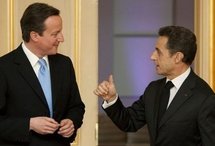
French President Nicolas Sarkozy (right) meets with now-Prime Minister of the UK, David Cameron, on 12th March 2010.
Dozens of conferences, exhibitions and film screenings are being held in schools, memorial sites and town halls across France this week to commemorate the appeal.
"Whatever happens, the flame of the French resistance must not and will not be extinguished," De Gaulle said, a day after Marechal Philippe Petain had announced plans for an armistice with the German invaders.
The week-long commemorations will culminate on Friday when Sarkozy travels to London. His visit lasts only a few hours before he flies back to France for a ceremony at the Mont Valerien memorial to the French Resistance near Paris.
The trip is rich in symbolism. Sarkozy, who will be accompanied on his London trip by his pop star wife Carla Bruni, will be the first French president to travel to the British capital to mark the event.
He will first head for the historic headquarters of the BBC to visit the studio where de Gaulle made the appeal.
Then he visits de Gaulle's wartime offices in Carlton Gardens, which are now rented by a law firm, after which he will lay a bouquet of flowers at the foot of the statute of the French leader outside.
A student from the French lycee in London will read out the de Gaulle speech to Sarkozy and to the 800 people invited from the Charles de Gaulle Foundation, from the Free French Foundation and other groups.
Many of the guests were due to travel from Paris to London on a specially chartered high-speed Eurostar train emblazoned with images of de Gaulle and other wartime French figures.
Sarkozy and Britain's newly-elected Prime Minister David Cameron and their wives were due to lunch together before the presidential couple flies back to Paris.
A leading World War II French historian this week said he was worried that some truths about France's wartime past were being played down amid the surge of patriotism around De Gaulle's June 18 appeal.
"History is being used as a political tool in a kind of national story-telling," Jean-Pierre Azema, author of more than a dozen works, told AFP in an interview.
De Gaulle was given a hero's welcome after the liberation of Paris in August 1944, but Azema pointed out that the French did not in 1940 regard De Gaulle as their saviour.
Azema said the French public must remember that De Gaulle's now-revered appeal went almost unnoticed at the time and came from a man not at all seen as destined to lead the country out of its darkest hour.
The British war cabinet had initially turned down De Gaulle's request to use the BBC to broadcast to France, but wartime Prime Minister Winston Churchill convinced his ministers to reverse their decision.
There are no recordings of the June 18 appeal, but the full text is inscribed on a bronze plaque at the foot of the Arc de Triomphe in Paris.
--------------------------------------------------------------------------------
"Whatever happens, the flame of the French resistance must not and will not be extinguished," De Gaulle said, a day after Marechal Philippe Petain had announced plans for an armistice with the German invaders.
The week-long commemorations will culminate on Friday when Sarkozy travels to London. His visit lasts only a few hours before he flies back to France for a ceremony at the Mont Valerien memorial to the French Resistance near Paris.
The trip is rich in symbolism. Sarkozy, who will be accompanied on his London trip by his pop star wife Carla Bruni, will be the first French president to travel to the British capital to mark the event.
He will first head for the historic headquarters of the BBC to visit the studio where de Gaulle made the appeal.
Then he visits de Gaulle's wartime offices in Carlton Gardens, which are now rented by a law firm, after which he will lay a bouquet of flowers at the foot of the statute of the French leader outside.
A student from the French lycee in London will read out the de Gaulle speech to Sarkozy and to the 800 people invited from the Charles de Gaulle Foundation, from the Free French Foundation and other groups.
Many of the guests were due to travel from Paris to London on a specially chartered high-speed Eurostar train emblazoned with images of de Gaulle and other wartime French figures.
Sarkozy and Britain's newly-elected Prime Minister David Cameron and their wives were due to lunch together before the presidential couple flies back to Paris.
A leading World War II French historian this week said he was worried that some truths about France's wartime past were being played down amid the surge of patriotism around De Gaulle's June 18 appeal.
"History is being used as a political tool in a kind of national story-telling," Jean-Pierre Azema, author of more than a dozen works, told AFP in an interview.
De Gaulle was given a hero's welcome after the liberation of Paris in August 1944, but Azema pointed out that the French did not in 1940 regard De Gaulle as their saviour.
Azema said the French public must remember that De Gaulle's now-revered appeal went almost unnoticed at the time and came from a man not at all seen as destined to lead the country out of its darkest hour.
The British war cabinet had initially turned down De Gaulle's request to use the BBC to broadcast to France, but wartime Prime Minister Winston Churchill convinced his ministers to reverse their decision.
There are no recordings of the June 18 appeal, but the full text is inscribed on a bronze plaque at the foot of the Arc de Triomphe in Paris.
--------------------------------------------------------------------------------









 Home
Home Politics
Politics









